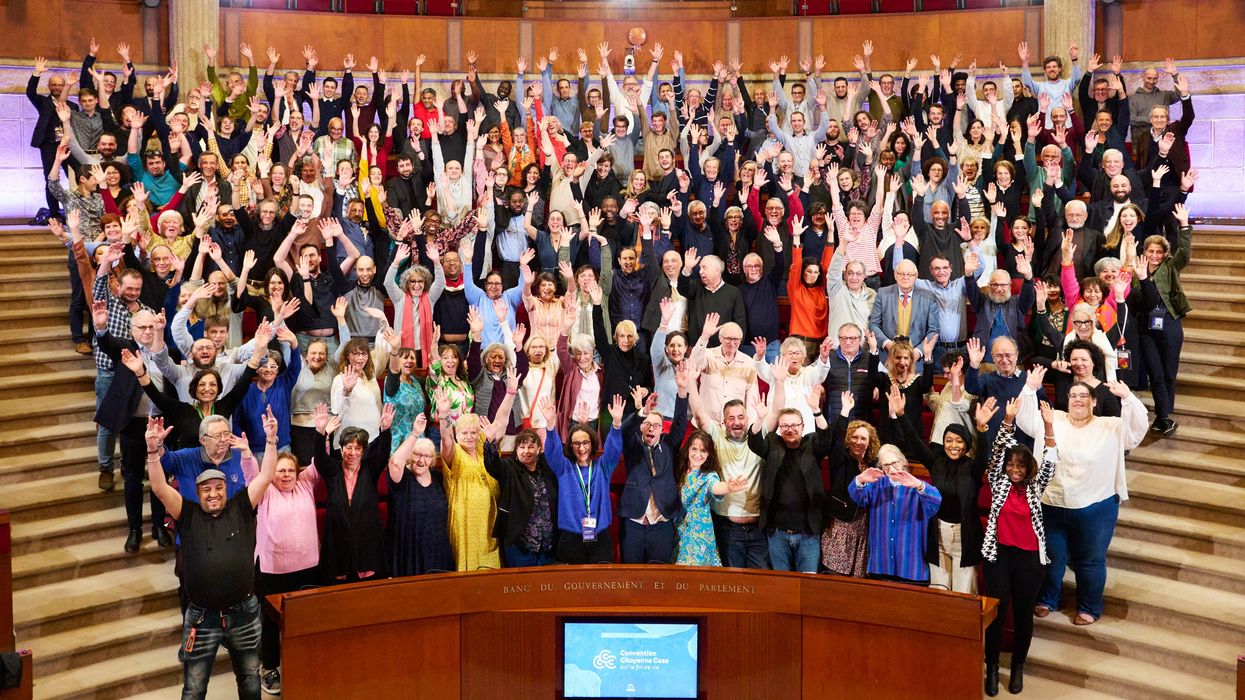Marjan H. Ehsassi is executive director of Federation for Innovation in Democracy - North America. Her book, “Activated Citizenship: The Transforming Power of Citizens’ Assemblies,” will be published this summer.
Over the past month, the presidential campaign in the United States has lurched breathlessly from one crisis to another. Donald Trump and Joe Biden — equally unpopular candidates — used their June debate to hurl insults, spout nonsense and compare golf handicaps. A couple weeks later, Trump nearly fell to an assassin’s bullet. And now President Biden has withdrawn from the race after a tumultuous intraparty rift.
In the wake of this chaos, millions of Americans have been left wondering: Is this really the best our democracy can do?
The frustration is palpable. A 2023 Pew Research survey found that 65 percent of Americans feel exhausted by politics. Only 20 percent trust the government to do what's right most of the time.
There must be a better way. A way to restore faith in democracy. A way to uphold freedom, equality and justice for all. A way to solve problems, not just win elections.
Fortunately, there is. It's called a citizens' assembly.
Citizens' assemblies bring together everyday people from all walks of life to tackle tough issues. Chosen by democratic lottery, the members are representative of their communities' diversity. They hear from experts, deliberate with one another, and collaborate to find common ground. The results are often surprising — and surprisingly effective.
In Petaluma, Calif., a citizens' assembly in 2022 convened 36 residents to decide the fate of the city’s large fairgrounds. After days of hearing from people on all sides of the debate — and spending hours in thoughtful discussion — the assembly issued a series of detailed recommendations to guide local officials. Similar assemblies have been used in Oregon, Canada and, most recently, Montrose, Colo.
The magic of citizens' assemblies lies in how they take partisanship out of the equation and encourage people to cooperate. Freed from bad incentives, members can listen, learn and work toward genuine solutions. Along the way, the members forge bonds of trust across the divides and find belonging in a new kind of community.
Here in North America, our organization — the Federation for Innovation in Democracy — is working to spread the power of citizens' assemblies far and wide. We seek to advance a democratic culture that’s inclusive, responsive and holds government accountable between elections.
At FIDE, we believe that citizens’ assemblies are the antidote to the polarized politics that’s left so many desperate for change. By empowering everyday citizens to engage directly in policymaking, citizens' assemblies honor the principle that all voices deserve to be heard. What’s more, they offer Americans a new form of service, a way for everyday citizens to contribute their time and talents to something greater than themselves.
Not only do we advocate for citizens' assemblies, we train practitioners and public managers at our Capacity Building Schools and provide technical guidance to help implement them — like the upcoming assemblies in Utah, British Columbia and Colorado.
Citizens’ assemblies can be used not just at the local level, but to heal our national nightmare, too. In the wake of Biden’s withdrawal (and an incendiary Republican convention) some commentators have called for an open process to let delegates meet candidates, hear their ideas, and think collectively about the best nominees.
That’s good. But we can do better. Imagine if instead of a handful of early primary states wielding outsized influence, we convened a national citizens' assembly to help vet candidates and craft party platforms (the way the Citizens’ Initiative Review has studied referenda in several states). Everyday Americans from across the country would have a real say, fulfilling the promise of government truly of, by and for the people.
Or picture a standing citizens' assembly working alongside Congress to break through partisan gridlock on issues like immigration, wages and health care reform. Their recommendations — rooted in deliberation and emerging from considered judgment, rather than political gamesmanship — could provide the blueprint for balancing individual liberty and the common good.
Outlandish? Maybe. But the governments of our peer nations, like the German Bundestag, are already doing this. And as we approach another contentious election, it's time to think big about renewing American democracy. Citizens' assemblies won't solve every problem. Yet through an inclusive and transparent process, they make for a powerful tool to put "We the People" back at the center.
Americans are right: There is a better way. Through the power of everyday people, citizens' assemblies can chart a new course for our nation — one that honors our most cherished ideals, strengthens the fabric of our democracy and gets our country back on track. It's time we give them a try.




















Trump & Hegseth gave Mark Kelly a huge 2028 gift